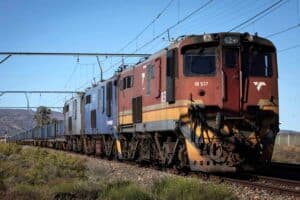The rating agency's assessment is that Transnet is "entirely dependent on state support" and faces "sizable negative free operating cash flow".

S&P Global’s downgrading exposes Transnet’s operational crisis as reform efforts stall, and it fails to meet its volume targets, burning cash at R13.5 billion per year.
This shows how important it is for government to attach strict conditions to future bailouts and accelerate private sector partnerships in ports and rail concessions rather than continuing unconditional support.
Busisiwe Mavuso, CEO of Business Leadership South Africa (BLSA), says the decision by S&P Global to downgrade Transnet’s credit rating was disappointing news for business in the private sector eager to see the utility performing better.
“This downgrade is not just a reflection of Transnet’s financial distress but a damning indictment of years of failed leadership, union militancy and a government that continues to bail out state-owned enterprises without demanding fundamental reform.”
She points out that S&P believes Transnet is burning cash without a prospect of turning around its operating performance, and that Transnet Freight Rail will fail to meet its volume targets. “The business has high fixed costs, major capital expenditure requirements and significant debt. S&P’s downgrade reflects its concern that its ability to service that debt is weakening.”
Mavuso says that when a company burns through so much cash every year, resulting in negative free cash flow, while its workers receive 6% pay increases at double the inflation rate, we are witnessing a textbook example of unsustainable economics enabled by government guarantees.
ALSO READ: Transnet capitulating to unions shows lack of leadership on both sides – BLSA
S&P calling out that Transnet is resisting change, moving too slowly
“S&P is calling out what has become clear to many of us: that Transnet is seemingly resisting change and moving too slowly. Compare Transnet to Eskom, which has been able to stabilise its operating performance and is pushing forward deep and fundamental reforms.
“The solution is not more bailouts or government guarantees. It is time for National Treasury to attach strict conditions to any future support, in the form of conditions that enable the private sector competition that Transnet desperately needs. The recent progress in separating rail infrastructure from operations, driven by Operation Vulindlela is a start, but we must move much faster.”
Mavuso says private sector partnerships in ports and rail concessions must be accelerated as companies are ready to invest in our logistics infrastructure. However, they need certainty that political interference and Transnet’s resistance will not undermine their investments.
“Fixing the logistics crisis is one of the focus points of the business-government partnership. Through the National Logistics Crisis Committee, there has been some progress as ports reduced backlogs and key rail corridors saw some volume improvements, but the fundamental issues remain, and the pace of reform has slowed just when it needs to be accelerating.”
ALSO READ: Creecy punts private sector investment for five rail and port corridors
Another meeting with government due to slow progress at Transnet
She says when business met with a senior government delegation led by President Cyril Ramaphosa in January, there was a strong commitment to accelerating reform to deliver economic growth. “When the logistics workstreams fell behind on key targets, we met again in May and agreed to a focused three-month sprint to catch up. That sprint needs additional impetus.
“There are critical structural reforms that must be advanced, particularly enabling third-party participation in rail and ports and operationalising the economic regulator that will regulate the logistics system for all.
“Also, as S&P makes clear, there is an urgent need to improve the operational performance of Transnet, from improving security to ensuring the availability of rolling stock, to fixing infrastructure. The plans to do all this through a partnership between the public and private sectors are in place, but either through intransigence or coordination failures, we have not been able to implement them.”
Mavuso says the S&P decision should be a wake-up call that Transnet is going in the wrong direction. “We must act urgently. Transnet cannot continue as if it is business as usual, and President Ramaphosa must act to get the agreed reforms implemented fast.”
ALSO READ: Outa welcomes dissolving of RAF board and cancelling of license card tender
Business welcomes disbanding board of RAF
She also welcomes the decisive action of transport minister Barbara Creecy in disbanding the Road Accident Fund (RAF) board. “This bold step represents the kind of leadership we desperately need to confront institutional dysfunction head-on.
“The RAF serves a critical function as our safety net against the devastating financial impact of road accidents, yet its track record of mismanagement has become a national embarrassment. With the Special Investigating Unit (SIU) now conducting a broader investigation at the minister’s request, we have an opportunity to root out the rot that has spawned endless litigation and operational chaos.
“South Africa deserves an RAF that operates with transparency, maintains clean books and delivers efficient service to those who need it most.”
Mavuso would like to see the same no-nonsense approach extended to other state insurance entities that continue to fail South Africans. “The Unemployment Insurance Fund (UIF) and Compensation Fund have become synonymous with bureaucratic incompetence and public frustration.
ALSO READ: Call for intervention in ‘horror show’ at Compensation Fund and UIF
UIF and Compensation Fund need same kind of decisive action
“When Business Unity South Africa called for the UIF to be placed under administration late last year, it was because workers were denied timely access to benefits they had rightfully earned. Similarly, the Compensation Fund’s failure to adequately support workers suffering from occupational injuries, illnesses, or workplace fatalities represents a betrayal of our most vulnerable citizens.
“While labour minister Nomakhosazana Meth initiated necessary leadership changes, these institutions remain far from delivering the world-class service standards our people deserve.”
She points out that every successful reform sends a powerful signal that we are serious about creating institutions that serve with integrity, efficiency and accountability. “The private sector stands ready to support this transformation, but government must lead with the courage to make hard decisions and the commitment to see them through. All South Africans depend on getting this right.”






